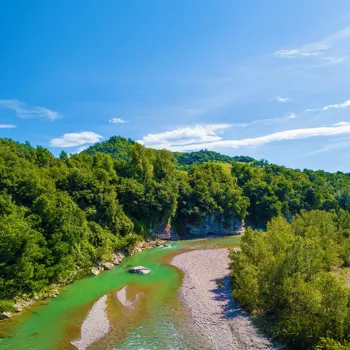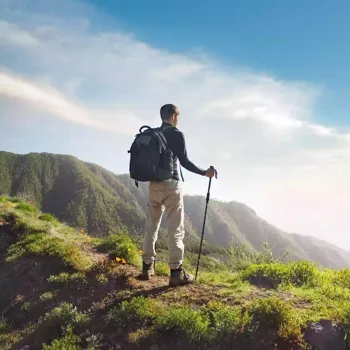Discover 10 ways to make your travels sustainable and eco-friendly. Explore the world responsibly and guilt-free. Read more!
The wanderlust bug has bitten! India is seeing a boom in travel, with more and more folks
exploring our incredible country and venturing abroad. But with this increase in globetrotting comes a bigger responsibility: taking care of our planet.

Sustainable travel is no longer a trend; it's a necessity. We need to ensure that future generations can enjoy the same beautiful landscapes and vibrant cultures that we do. So, how can you travel with a lighter footprint?
Here are ten simple yet effective ways to make your travels more sustainable and eco-friendly, allowing you to explore the world responsibly and guilt-free.
Pack Light and Smart: Your Back (and the Planet) Will Thank You
Overpacking is a common travel woe. We tend to throw in everything "just in case," but that extra weight has consequences. A heavier suitcase means more fuel consumption for the plane, train, or car, leading to increased carbon emissions.

So, before you start stuffing your bags, take a moment to strategize. Think about versatile clothing items that can be mixed and matched. Opt for lightweight fabrics that dry quickly. Consider using packing cubes to compress your clothes and save space.
Leave behind unnecessary toiletries; many hotels provide them, or you can buy travel-sized, eco-friendly versions at your destination. By packing light and smart, you'll not only save yourself from back pain but also reduce your carbon footprint and travel more sustainably.
Consider investing in reusable travel bottles and containers as well; this will help you to minimize your use of disposable plastic items while you are traveling. Always carry a refillable water bottle wherever one goes, and fill it from water dispensers.
Choose Eco-Friendly Accommodation: A Home Away From Home, Sustainably
Where you stay can significantly impact your environmental footprint. Seek out accommodations that are committed to sustainability.

Look for hotels or guesthouses that have implemented eco-friendly practices, such as solar panels, rainwater harvesting, energy-efficient lighting, and water conservation measures. Many accommodations now have certifications that show their effort to contribute to saving the planet.
Check if they have recycling programs in place and if they use eco-friendly cleaning products. Consider staying in locally owned establishments, as they often have a deeper connection to the community and are more likely to support local businesses.
Homestays and farm stays are also great options for experiencing local culture while minimizing your environmental impact. Read reviews and ask questions about their sustainability practices before booking. This way, you can ensure that your accommodation aligns with your eco-conscious values.
Embrace Public Transport and Active Travel: Explore Like a Local
Ditch the taxis and private cars whenever possible and embrace public transport. Buses, trains, and metros are generally more fuel-efficient and emit fewer greenhouse gases per passenger than individual vehicles. Plus, it's a great way to immerse yourself in the local culture and observe daily life.
Walking, cycling, and using local transport are healthier ways of traveling. Opt for walking or cycling whenever possible, especially for shorter distances within cities. Many cities now offer bike-sharing programs, making it easy to explore at your own pace.
Not only will you reduce your carbon footprint, but you'll also get some exercise and discover hidden gems that you might have missed otherwise. By embracing public transport and active travel, you'll experience your destination in a more authentic and sustainable way.
Reduce, Reuse, Recycle: The Golden Rule Applies on the Road Too
The three R's – Reduce, Reuse, and Recycle – are just as important when you're traveling as they are at home. Reduce your consumption by avoiding single-use plastics. Say no to plastic straws, cups, and cutlery. Carry your own reusable water bottle, coffee cup, and shopping bag.

When shopping, choose products with minimal packaging and opt for eco-friendly alternatives. Reuse items whenever possible. Refill your water bottle, reuse your shopping bag, and repurpose containers. Recycle whenever possible. Look for recycling bins at your accommodation and at public places.
Be mindful of what you discard and make an effort to separate recyclables from other waste. By following the three R's, you can significantly reduce your environmental impact while traveling.
Support Local Businesses and Communities: Give Back to the Places You Visit
Put money into the local economy by supporting local businesses and communities. Instead of eating at chain restaurants, try local eateries that serve traditional cuisine made with fresh, locally sourced ingredients. Shop at local markets and artisan shops instead of buying mass-produced souvenirs.

Buy local products to support the local economy there by supporting local farmers and food producers. Hire local guides for tours and activities. Staying at smaller,locally owned businesses can ensure the tourist's money, is money which ensures that the local people profit.
Be respectful of local customs and traditions, and learn a few basic phrases in the local language. By supporting local businesses and communities, you'll contribute to the economic well-being of the places you visit and have a more authentic and enriching travel experience.
Be a Responsible Tourist: Leave No Trace Behind
Respect the environment and local culture wherever you go. Avoid littering and dispose of waste properly. Stay on marked trails when hiking and avoid disturbing wildlife or their habitats. Be mindful of your water consumption and avoid wasting water.

Respect local customs and traditions, and dress appropriately when visiting religious sites. Avoid taking photos of people without their permission. Be aware of the impact of your actions and strive to minimize your negative impact on the environment and local culture.
Leave no trace behind, and leave the places you visit as you found them, or even better. Always ensure to leave a minimal footprint in any location that you are in.
Offset Your Carbon Footprint: Atone for Your Emissions
Flying is one the most environmentally damaging things that one can do, so if you are using air travel, then it is important to offset your carbon footprint. Carbon offsetting involves investing in projects that reduce carbon emissions, such as renewable energy projects or reforestation programs.

Many airlines offer carbon offsetting programs when you book your flight, or you can find reputable carbon offsetting organizations online. While offsetting your carbon footprint doesn't eliminate your emissions entirely, it helps to mitigate the environmental impact of your travel.
Consider it a way to atone for your emissions and contribute to a more sustainable future.
Choose Sustainable Tours and Activities: Explore Responsibly
When booking tours and activities, choose operators that are committed to sustainability. Look for those who follow responsible tourism practices, such as minimizing their environmental impact, supporting local communities, and respecting wildlife.

Avoid activities that harm the environment or exploit animals. Opt for eco-friendly options, such as hiking, kayaking, or cycling tours. Support local guides and operators who are knowledgeable about the local environment and culture.
By choosing sustainable tours and activities, you can explore responsibly and contribute to the preservation of the places you visit. Take your trash with you when you leave. Make sure you keep the trails clean.
Educate Yourself and Others: Spread the Word About Sustainable Travel
Learn about the environmental and social issues facing the places you plan to visit. Understand the impact of tourism on local communities and ecosystems. Share your knowledge with others and encourage them to travel more sustainably.

Talk to your friends, family, and colleagues about the importance of responsible travel. Write about your experiences on social media and inspire others to make a positive impact. The responsibility of saving the planet is on everyone.
By educating yourself and others, you can help to raise awareness about sustainable travel and inspire positive change.
Be Patient and Flexible: Embrace the Unexpected
Sustainable travel sometimes requires a bit more patience and flexibility than conventional travel. Be prepared to make adjustments to your plans and be open to new experiences. Embrace the unexpected and be willing to try new things.

Remember that the journey is just as important as the destination. By being patient and flexible, you'll not only reduce your stress levels but also open yourself up to unforgettable experiences and a deeper connection with the places you visit.
By keeping these points in mind, you can make your next travel experience, a memorable one and save the planet.
AI Generated Content. Glance/InMobi shall have no liability for the content
















